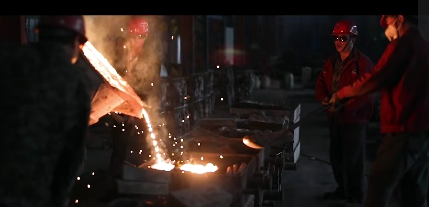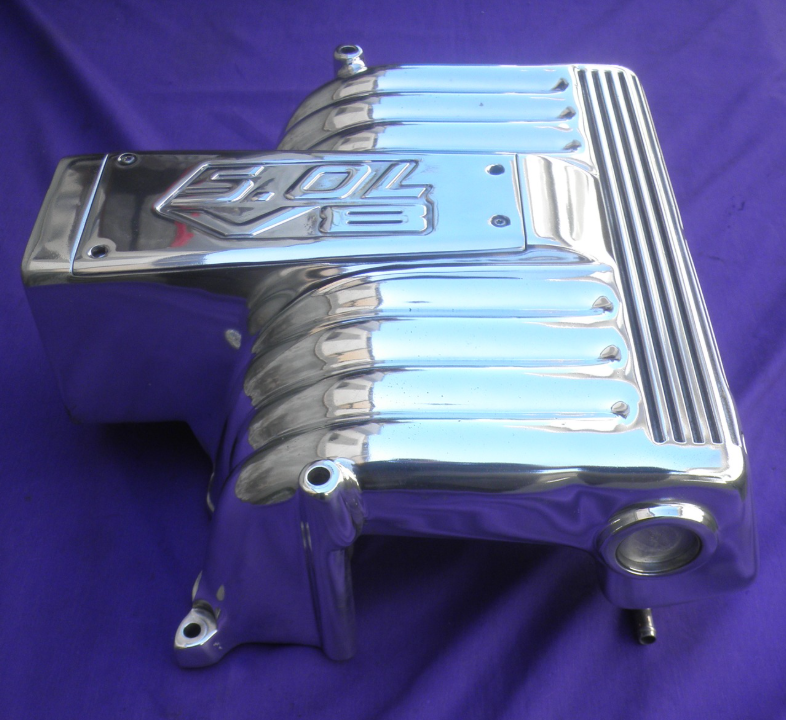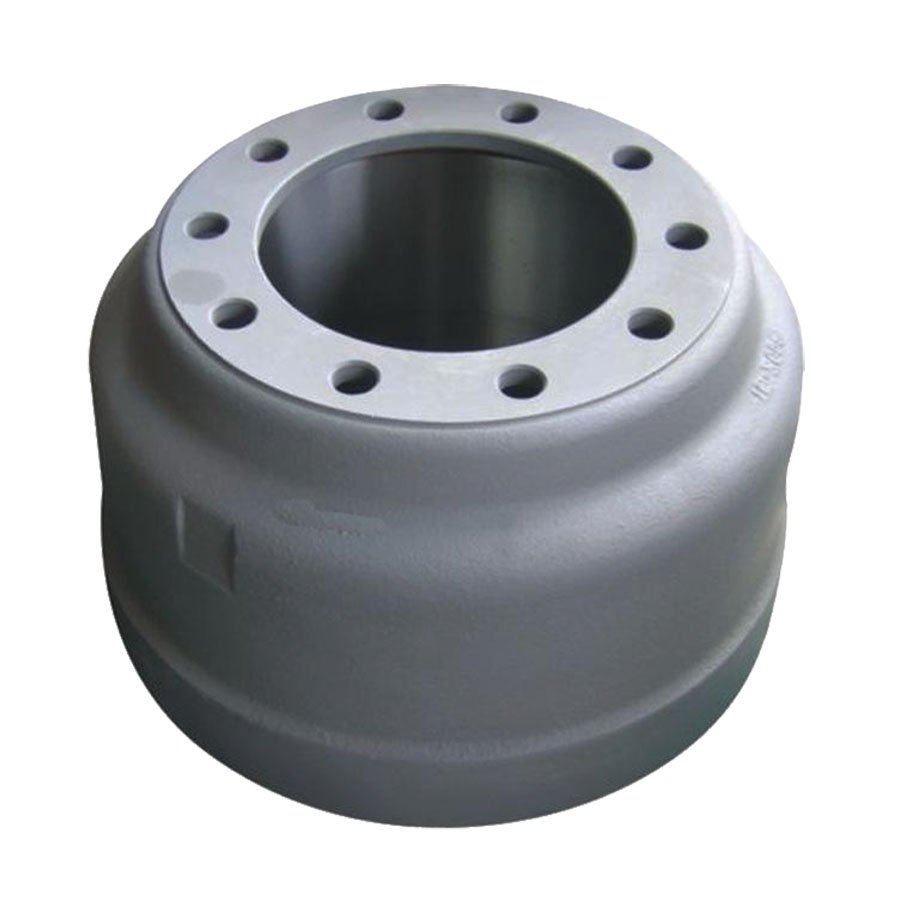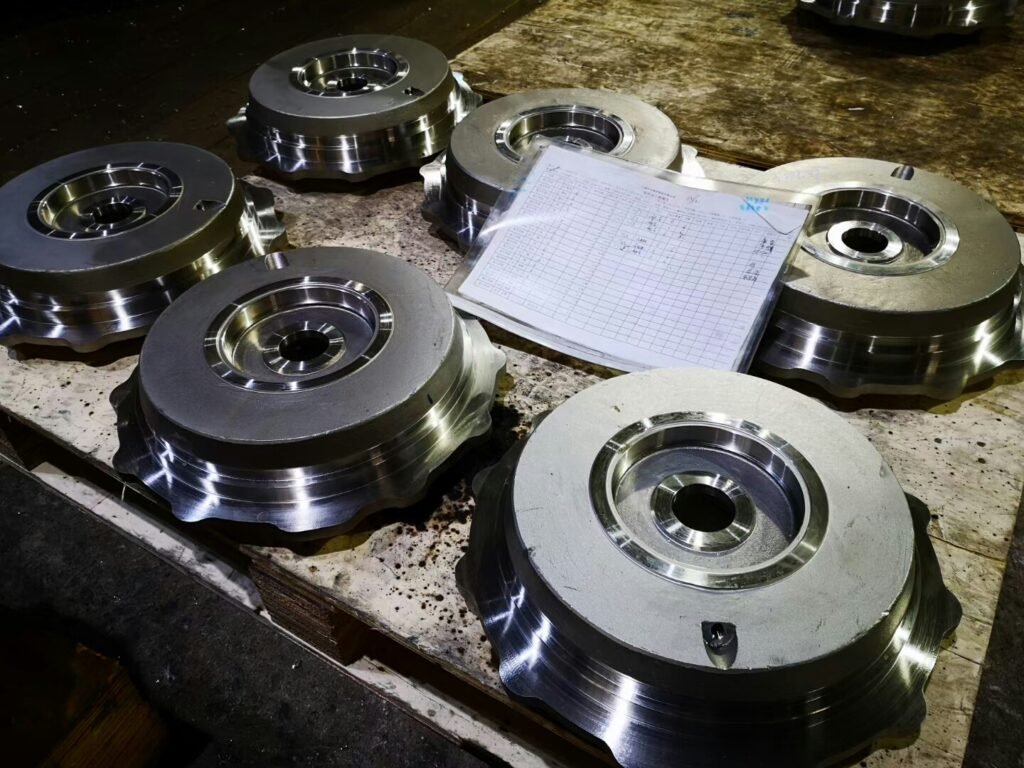Carbon steel castings are a cornerstone in manufacturing and engineering. As a material known for its strength, durability, and versatility, carbon steel is extensively used in various industries. Understanding what industries utilize OEM (Original Equipment Manufacturer) carbon steel castings and why they are so integral can provide insight into the complex world of industrial manufacturing.
OEM carbon steel castings play a critical role in many sectors, ranging from automotive and aerospace to construction and oil and gas. This article will explore the various industries that rely on carbon steel castings, why these materials are favored, and how choosing the right OEM carbon steel casting manufacturer can significantly impact product quality and performance.
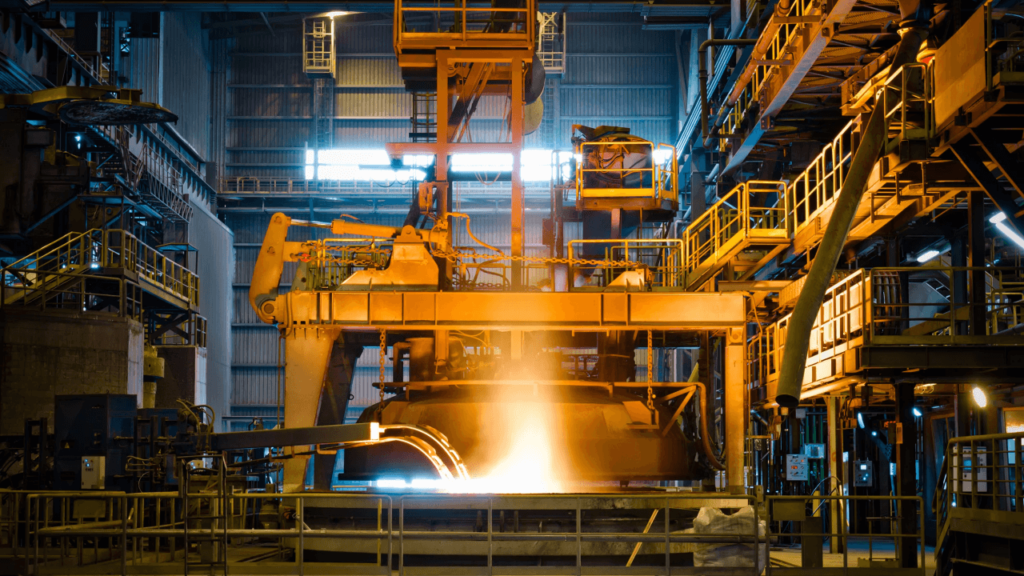
Introduction
Definition of OEM Carbon Steel Castings
OEM carbon steel castings are components specifically manufactured to meet the requirements of an original equipment manufacturer. These parts are custom-designed to fit the exact specifications and needs of the OEM’s products. The term “OEM” is crucial here because it denotes not just the origin of the components but also their customization and the precision required in their manufacture.
Carbon steel castings are produced by melting carbon steel and pouring it into molds to achieve a specific shape. The casting process allows for the creation of complex and detailed parts that are difficult or impossible to make using other manufacturing methods. This process is ideal for producing parts that require a high degree of precision, strength, and durability.
Importance of Carbon Steel Castings in Modern Industry
The importance of carbon steel castings in modern industry cannot be overstated. Carbon steel, with its excellent mechanical properties, serves as a fundamental building block for many industrial applications. It is a material that combines strength, ductility, and toughness, making it ideal for manufacturing parts that must withstand significant stress and wear.
Carbon steel castings are integral to the functionality of many industrial machines and equipment. From automotive engines and construction machinery to oil rigs and aerospace components, carbon steel castings provide the backbone that supports the operation of critical systems. The ability of these castings to endure extreme conditions and resist wear and tear makes them a preferred choice in many demanding environments.
Moreover, the use of carbon steel castings can enhance the overall performance and longevity of industrial equipment. When produced by a reputable OEM carbon steel casting manufacturer, these components can significantly reduce maintenance costs and downtime, leading to improved efficiency and productivity for businesses.
As we delve deeper into the various industries that utilize OEM carbon steel castings, it becomes evident why this material and its manufacturing process are so vital. By understanding the unique benefits and applications of carbon steel castings, companies can make informed decisions when selecting materials and manufacturers for their specific needs.
Overview of Carbon Steel Casting Process
What is Carbon Steel?
Carbon steel is a versatile material used extensively in the manufacturing industry due to its strength, durability, and cost-effectiveness. It is an alloy of iron and carbon, with carbon content varying from 0.05% to 2.0% by weight. The carbon content significantly impacts the steel’s properties, making it suitable for various applications. Carbon steel is classified into four main categories based on its carbon content:
- Low Carbon Steel (Mild Steel): Contains up to 0.25% carbon. It is highly ductile, making it easy to shape and weld, which is why it is often used in construction and automotive industries.
- Medium Carbon Steel: Contains 0.25% to 0.60% carbon. This type of steel offers a balance between strength and ductility, making it suitable for machinery parts and automotive components that require higher strength.
- High Carbon Steel: Contains 0.60% to 1.25% carbon. It is known for its high strength and hardness, but it is less ductile and more challenging to weld. This steel type is often used for cutting tools and high-strength wires.
- Ultra-High Carbon Steel: Contains 1.25% to 2.0% carbon. This steel is extremely hard and brittle, making it ideal for applications requiring extreme wear resistance, such as industrial knives and blades.
Each type of carbon steel has unique properties that make it suitable for different casting applications. The choice of carbon steel depends on the specific requirements of the component being manufactured, including its strength, toughness, and machinability.
How Are Carbon Steel Castings Made?
The process of making carbon steel castings involves several critical steps that ensure the final product meets the required specifications. Here’s an overview of the typical carbon steel casting process:
- Pattern Making: The process begins with creating a pattern or replica of the part to be cast. This pattern is typically made from wood, plastic, or metal and is used to create a mold cavity into which the molten steel will be poured. The pattern must be designed with precision, considering factors such as shrinkage and machining allowances.
- Molding: Once the pattern is ready, it is used to create a mold. The mold is made by packing sand around the pattern and then removing the pattern, leaving a cavity in the shape of the final casting. The mold is typically made of silica sand mixed with a binder to give it strength and stability.
- Melting and Pouring: The next step involves melting the carbon steel in a furnace. The molten steel is then carefully poured into the mold cavity. This process must be carried out with precision to avoid defects such as air pockets or inclusions that can compromise the quality of the casting.
- Cooling and Solidification: After the molten steel is poured into the mold, it is left to cool and solidify. The cooling process is critical because it affects the microstructure and mechanical properties of the steel. Proper cooling ensures that the casting has the desired strength, hardness, and ductility.
- Finishing: Once the casting has solidified and cooled, it is removed from the mold and undergoes a series of finishing operations. These operations may include trimming excess material, grinding, heat treatment, and surface finishing to achieve the desired dimensions and surface quality.
- Inspection: The final step in the casting process is inspection. The castings are thoroughly inspected for defects and dimensional accuracy. Non-destructive testing methods, such as X-ray and ultrasonic testing, may be used to detect internal defects that are not visible to the naked eye.
Advantages of Using Carbon Steel for Castings
Using carbon steel for castings offers several advantages that make it a preferred choice for many industries:
- Strength and Durability: Carbon steel has excellent strength and toughness, making it ideal for applications where components are subjected to high stress and impact.
- Cost-Effectiveness: Carbon steel is relatively inexpensive compared to other materials such as stainless steel or aluminum. This cost advantage makes it an attractive option for large-scale manufacturing.
- Machinability: Carbon steel can be easily machined, allowing for precise shaping and finishing of cast components. This property is essential for creating complex parts that require tight tolerances.
- Weldability: Carbon steel can be easily welded, making it suitable for applications where components need to be joined together. This property is particularly valuable in industries such as construction and automotive, where welded assemblies are common.
- Versatility: Carbon steel can be alloyed with other elements to enhance its properties, such as increasing its hardness, corrosion resistance, or wear resistance. This versatility allows manufacturers to tailor the material to specific application requirements.
The combination of these advantages makes carbon steel an ideal material for casting, providing the strength, durability, and cost-efficiency needed for a wide range of industrial applications.
Key Industries That Use OEM Carbon Steel Castings
Automotive Industry
The automotive industry is one of the largest consumers of OEM carbon steel castings. The demand for high-quality, durable components is paramount in this sector, where safety, performance, and cost are key considerations. Carbon steel castings are used in a variety of automotive parts, including:
- Engine Blocks and Cylinder Heads: Carbon steel’s ability to withstand high temperatures and pressures makes it an ideal material for engine blocks and cylinder heads, which are critical components in automotive engines.
- Suspension Components: Parts such as control arms, brackets, and knuckles are often made from carbon steel castings due to their strength and ability to absorb shocks and vibrations.
- Brake Components: Carbon steel castings are used in brake calipers and brackets, where strength and durability are essential for safe and effective braking.
The use of carbon steel castings in the automotive industry provides several benefits, including reduced weight, improved fuel efficiency, and enhanced safety. By choosing a reputable OEM carbon steel casting manufacturer, automotive companies can ensure that their components meet stringent quality standards and deliver reliable performance.
Construction Industry
In the construction industry, carbon steel castings are widely used for their strength, durability, and resistance to wear and corrosion. They are commonly found in construction equipment and structural components, such as:
- Construction Equipment: Carbon steel castings are used in the manufacture of heavy machinery and equipment, including excavators, bulldozers, and cranes. These components must withstand harsh operating conditions, including heavy loads, impact, and abrasion.
- Structural Components: Carbon steel castings are also used in the construction of buildings, bridges, and other infrastructure. They provide the necessary strength and stability to support large structures and resist environmental factors such as wind, earthquakes, and temperature fluctuations.
The use of carbon steel castings in construction applications helps ensure the longevity and safety of structures and equipment. Working with an experienced OEM carbon steel casting manufacturer can help construction companies obtain high-quality castings that meet their specific needs.
Aerospace Industry
The aerospace industry demands materials that offer exceptional strength, precision, and resistance to extreme conditions. Carbon steel castings are used in various aerospace applications, including:
- Landing Gear: Carbon steel castings are used in landing gear components due to their strength, toughness, and ability to withstand impact and stress during takeoff and landing.
- Structural Frames and Engine Components: The aerospace industry requires lightweight yet strong materials for structural frames and engine components. Carbon steel castings provide the necessary strength while allowing for complex geometries and precise tolerances.
The use of carbon steel castings in aerospace applications ensures that components can withstand the rigors of flight and provide reliable performance in demanding environments. Choosing a qualified OEM carbon steel casting manufacturer is essential to meet the stringent standards and certifications required in the aerospace industry.
Oil and Gas Industry
The oil and gas industry operates in some of the harshest environments on the planet, where equipment must endure extreme temperatures, pressures, and corrosive substances. Carbon steel castings are widely used in this industry for components such as:
- Valve Bodies and Pump Housings: Carbon steel castings are used in valve bodies and pump housings due to their ability to withstand high pressure and resist corrosion. These components are essential for controlling the flow of oil and gas and ensuring the safe operation of pipelines and equipment.
- Drilling Equipment: Carbon steel castings are also used in drilling equipment, such as drill bits and casings, where strength and wear resistance are critical for drilling through tough geological formations.
The use of carbon steel castings in the oil and gas industry helps ensure the reliability and safety of equipment, reducing the risk of failures and costly downtime. Partnering with a reliable OEM carbon steel casting manufacturer can help oil and gas companies obtain castings that meet the demanding requirements of their industry.
Agricultural Equipment Manufacturing
Agricultural equipment manufacturers rely on carbon steel castings for various machinery parts that must endure heavy use and harsh environmental conditions. Examples of agricultural equipment components made from carbon steel castings include:
- Plowshares and Harrow Discs: These components are subjected to constant abrasion and impact as they till the soil. Carbon steel’s toughness and wear resistance make it an ideal material for these applications.
- Tractor Parts: Carbon steel castings are used in tractor parts, such as transmission housings and engine components, where strength and durability are essential for reliable operation in the field.
By using carbon steel castings, agricultural equipment manufacturers can produce robust and long-lasting machinery that meets the needs of farmers and agricultural businesses. Working with an experienced OEM carbon steel casting manufacturer ensures that the castings meet the specific requirements of the agricultural industry.
Mining Industry
The mining industry requires heavy-duty equipment that can withstand extreme conditions, including high impact, abrasion, and corrosive environments. Carbon steel castings are used in a variety of mining equipment, such as:
- Crushers and Grinding Mills: Carbon steel castings are used in crushers and grinding mills, where they provide the necessary strength and wear resistance to break down hard rocks and minerals.
- Conveyor Components: Carbon steel castings are also used in conveyor components, such as rollers and frames, which must endure heavy loads and constant movement.
The use of carbon steel castings in the mining industry helps ensure the durability and reliability of equipment, reducing maintenance costs and downtime. Partnering with a reputable OEM carbon steel casting manufacturer can help mining companies obtain high-quality castings that meet the demands of their industry.
Power Generation
Carbon steel castings are used in various power generation applications, including both fossil fuel and renewable energy sectors. Examples of power generation components made from carbon steel castings include:
- Turbine Components: Carbon steel castings are used in turbine components, such as blades and casings, where they must withstand high temperatures and pressures during operation.
- Generator Parts: Carbon steel castings are also used in generator parts, such as housings and rotors, where strength and durability are essential for reliable power generation.
The use of carbon steel castings in power generation helps ensure the efficiency and longevity of equipment, reducing the risk of failures and costly downtime. Choosing a qualified OEM carbon steel casting manufacturer is crucial to obtaining castings that meet the specific requirements of the power generation industry.
Emerging Applications of Carbon Steel Castings
Renewable Energy Sector
As the world shifts towards renewable energy, carbon steel castings are finding new applications in this growing sector. Some examples include:
- Wind Turbine Components: Carbon steel castings are used in wind turbine components, such as hubs, frames, and shafts, where strength and durability are essential for withstanding the forces generated by wind.
- Solar Panel Mounts: Carbon steel castings are also used in solar panel mounts, providing the necessary strength and stability to support solar panels in various environmental conditions.
The use of carbon steel castings in renewable energy applications supports the transition to sustainable energy sources, helping reduce carbon emissions and promote environmental sustainability. Partnering with an experienced OEM carbon steel casting manufacturer can help renewable energy companies obtain high-quality castings that meet their specific needs.
Marine Industry
The marine industry requires materials that can withstand the corrosive effects of seawater and the stresses of marine environments. Carbon steel castings are used in various marine applications, including:
- Shipbuilding: Carbon steel castings are used in shipbuilding for components such as anchors, propellers, and structural frames, where strength and corrosion resistance are essential.
- Offshore Platforms: Carbon steel castings are also used in offshore platforms, such as oil rigs and wind farms, where they provide the necessary durability to withstand harsh marine conditions.
The use of carbon steel castings in marine applications helps ensure the reliability and longevity of ships and offshore structures, reducing maintenance costs and downtime. Choosing a reputable OEM carbon steel casting manufacturer is essential to obtaining castings that meet the specific requirements of the marine industry.
Heavy Machinery and Equipment Manufacturing
Heavy machinery and equipment manufacturers rely on carbon steel castings for components that must endure heavy loads, high impact, and wear. Examples of heavy machinery components made from carbon steel castings include:
- Excavator Buckets: Carbon steel castings are used in excavator buckets, where strength and wear resistance are essential for digging and lifting heavy materials.
- Crusher Liners: Carbon steel castings are also used in crusher liners, where they provide the necessary toughness to withstand the impact and abrasion of crushing hard rocks.
The use of carbon steel castings in heavy machinery and equipment manufacturing helps ensure the durability and reliability of equipment, reducing maintenance costs and downtime. Partnering with a qualified OEM carbon steel casting manufacturer can help heavy machinery companies obtain high-quality castings that meet their specific needs.
Advantages of Using OEM Carbon Steel Castings in Various Industries
Customization and Flexibility
One of the primary advantages of using OEM carbon steel castings is the ability to customize and tailor the castings to meet specific requirements and designs. Unlike standard off-the-shelf components, OEM castings are designed and manufactured according to the precise specifications provided by the customer. This level of customization ensures that the components fit perfectly into the desired application, providing optimal performance and reliability.
Moreover, OEM carbon steel castings offer flexibility in terms of design and material selection. Manufacturers can choose the appropriate type of carbon steel and adjust the casting process to achieve the desired properties, such as strength, hardness, and wear resistance. This flexibility allows for the creation of components that are uniquely suited to the specific demands of the industry.
Cost Efficiency and Material Savings
Using carbon steel castings offers significant cost advantages, making it a cost-effective choice for many industries. Carbon steel is generally less expensive than other metals, such as stainless steel or aluminum, reducing material costs for manufacturers. Additionally, the casting process allows for efficient use of materials, minimizing waste and reducing overall production costs.
OEM carbon steel castings also provide cost savings in terms of production efficiency. By creating components that are precisely tailored to the application, manufacturers can reduce the need for additional machining, welding, or assembly operations. This streamlined production process helps lower labor costs and shorten lead times, resulting in faster delivery of finished products to customers.
Improved Product Performance and Durability
OEM carbon steel castings are known for their exceptional strength, toughness, and durability, making them ideal for demanding applications where components are subjected to high stress, impact, and wear. The casting process allows for the creation of complex geometries and intricate designs that would be challenging or impossible to achieve using other manufacturing methods.
By working with a reputable OEM carbon steel casting manufacturer, companies can ensure that their components meet the highest quality standards and deliver reliable performance in even the most challenging environments. This level of quality and durability helps improve the overall performance and longevity of industrial equipment, reducing the need for frequent maintenance and repairs.
Challenges in Using Carbon Steel Castings
Quality Control Issues
One of the primary challenges in using carbon steel castings is ensuring consistent quality and minimizing defects. Common defects in carbon steel castings include porosity, shrinkage, cracks, and inclusions, which can compromise the strength and integrity of the final product. These defects can occur due to various factors, such as improper mold design, inadequate melting and pouring practices, and insufficient cooling and solidification control.
To overcome these challenges, manufacturers must implement rigorous quality control measures throughout the casting process. This includes using high-quality materials, employing skilled technicians, and conducting thorough inspections and testing to identify and address any defects. Working with an experienced OEM carbon steel casting manufacturer that follows strict quality assurance protocols can help ensure the production of high-quality castings that meet the required specifications.
Environmental Impact
The casting process can have a significant environmental impact, particularly in terms of energy consumption and emissions. Melting and pouring carbon steel require high temperatures, which consume large amounts of energy and generate greenhouse gas emissions. Additionally, the use of sand molds and other materials can result in waste and environmental pollution.
To address these environmental concerns, manufacturers are increasingly adopting sustainable casting practices and technologies. This includes using energy-efficient furnaces, recycling sand and other materials, and implementing waste management strategies to minimize environmental impact. By choosing an environmentally responsible OEM carbon steel casting manufacturer, companies can reduce their carbon footprint and contribute to a more sustainable future.
Supply Chain and Logistics
Managing the supply chain and logistics for carbon steel castings can be challenging, particularly when sourcing materials and coordinating production and delivery schedules. Factors such as fluctuations in raw material prices, transportation costs, and geopolitical events can impact the availability and cost of carbon steel, affecting the overall production process.
To mitigate these challenges, manufacturers must develop robust supply chain management strategies that include diversifying suppliers, optimizing inventory levels, and maintaining strong relationships with key suppliers. Partnering with a reliable OEM carbon steel casting manufacturer can also help ensure a stable supply of high-quality castings and minimize disruptions in the production process.
How to Choose the Right OEM for Carbon Steel Castings
Key Factors to Consider
When selecting an OEM carbon steel casting manufacturer, it is essential to consider several key factors to ensure you choose the right partner for your needs:
- Experience and Expertise: Look for a manufacturer with extensive experience and expertise in producing carbon steel castings for your specific industry. An experienced manufacturer will have a deep understanding of the unique requirements and challenges of your industry and can provide valuable insights and recommendations.
- Technological Capabilities: Consider the manufacturer’s technological capabilities and equipment. A manufacturer with advanced casting technologies and state-of-the-art equipment will be better equipped to produce high-quality castings that meet your exact specifications.
- Quality Assurance: Quality is paramount when it comes to carbon steel castings. Ensure that the manufacturer has a robust quality assurance program in place, including rigorous testing and inspection procedures, to guarantee the quality and reliability of their castings.
Questions to Ask Potential Suppliers
To make an informed decision when choosing an OEM carbon steel casting manufacturer, ask potential suppliers the following questions:
- What is your experience in my industry? Understanding the manufacturer’s experience and track record in your specific industry can provide insight into their ability to meet your needs.
- Can you provide case studies or references? Requesting case studies or references from previous customers can help you assess the manufacturer’s capabilities and reputation.
- What are your quality control processes? Inquire about the manufacturer’s quality control processes and certifications to ensure they meet the required standards for your industry.
The Importance of Collaboration and Communication
Building a strong partnership with your OEM carbon steel casting manufacturer is essential for achieving successful outcomes. Effective collaboration and communication throughout the design, production, and delivery process can help ensure that your requirements are clearly understood and met. By fostering open and transparent communication with your manufacturer, you can address any issues or concerns promptly and work together to achieve the best possible results.
Future Trends in Carbon Steel Casting Industry
Technological Advancements
The carbon steel casting industry is constantly evolving, with new technologies and advancements driving improvements in quality, efficiency, and sustainability. Some of the key technological trends in the industry include:
- Automation and Robotics: The use of automation and robotics in the casting process is increasing, allowing manufacturers to achieve higher precision, consistency, and efficiency. Automated systems can perform tasks such as mold preparation, pouring, and finishing with greater accuracy and speed, reducing the risk of defects and improving overall quality.
- Additive Manufacturing: Additive manufacturing, or 3D printing, is becoming more prevalent in the casting industry. This technology allows for the creation of complex molds and patterns with high precision and minimal waste. By integrating additive manufacturing into the casting process, manufacturers can reduce lead times, lower costs, and produce more intricate and customized castings.
Shifts Towards Sustainability
As environmental concerns continue to grow, the carbon steel casting industry is increasingly focusing on sustainability. Manufacturers are adopting eco-friendly practices and technologies to reduce their environmental impact and meet regulatory requirements. Some of the key sustainability trends in the industry include:
- Energy Efficiency: Manufacturers are investing in energy-efficient furnaces and equipment to reduce energy consumption and greenhouse gas emissions during the casting process. By optimizing energy use, companies can lower their carbon footprint and reduce operating costs.
- Waste Reduction: Recycling and reusing materials, such as sand and scrap metal, are becoming more common in the casting industry. By minimizing waste and reusing materials, manufacturers can reduce their environmental impact and improve resource efficiency.
Global Market Dynamics
The global market for carbon steel castings is influenced by various factors, including economic conditions, trade policies, and technological advancements. As the demand for high-quality, durable components continues to grow across industries, the market for carbon steel castings is expected to expand. Key trends shaping the global market include:
- Growing Demand in Emerging Markets: Emerging markets, such as Asia-Pacific and Latin America, are experiencing rapid industrialization and infrastructure development, driving the demand for carbon steel castings. These regions are expected to play a significant role in the growth of the global market.
- Impact of Trade Policies: Trade policies and tariffs can have a significant impact on the global market for carbon steel castings. Manufacturers must navigate complex trade regulations and adapt to changing policies to remain competitive in the global market.
Conclusion
Summary of Key Points
OEM carbon steel castings are essential components in various industries, including automotive, construction, aerospace, oil and gas, agriculture, mining, power generation, and more. These castings offer numerous advantages, such as customization, cost efficiency, and improved performance and durability. By understanding the unique benefits and applications of carbon steel castings, companies can make informed decisions when selecting materials and manufacturers for their specific needs.
Final Thoughts
As the carbon steel casting industry continues to evolve, it is crucial for companies to stay informed about the latest trends and advancements. By partnering with a reputable OEM carbon steel casting manufacturer, businesses can ensure that their components meet the highest quality standards and deliver reliable performance in even the most demanding environments. Whether you are looking to reduce costs, improve efficiency, or enhance product performance, carbon steel castings offer a versatile and cost-effective solution for a wide range of industrial applications.
If you are interested in learning more about OEM carbon steel castings or exploring how they can benefit your business, we encourage you to reach out to us for more information. Our team of experts is here to answer your questions and provide the guidance you need to make informed decisions. Contact us today to discuss your specific requirements and discover how our high-quality carbon steel castings can help you achieve your goals.


